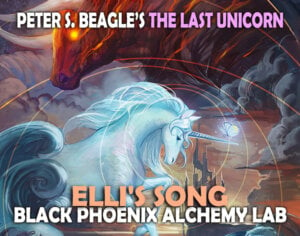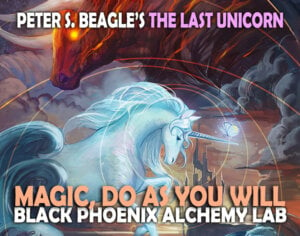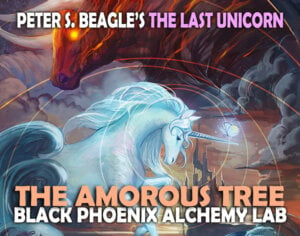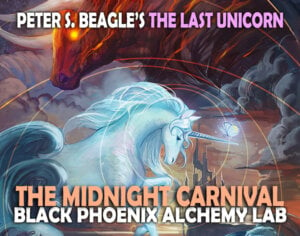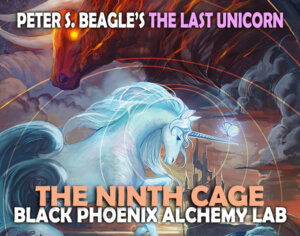The Last Unicorn
-
Elli’s Song Perfume Oil
Add to cart“Most shows,” said Rukh after a time, “would end here, for what could they possibly present after a genuine unicorn? But Mommy Fortuna’s Midnight Carnival holds one more mystery yet — a demon more destructive than the dragon, more monstrous than the manticore, more hideous than the harpy, and certainly more universal than the unicorn.” He waved his hand toward the last wagon and the black hangings began to wriggle open, though there was no one pulling them. “Behold her!” Rukh cried. “Behold the last, the Very End! Behold Elli!”
Inside the cage, it was darker than the evening, and cold stirred behind the bars like a live thing. Something moved in the cold, and the unicorn saw Elli — an old, bony, ragged woman who crouched in the cage rocking and warming herself before a fire that was not there. She looked so frail that the weight of the darkness should have crushed her, and so helpless and alone that the watchers should have rushed forward in pity to free her. Instead, they began to back silently away, for all the world as though Elli were stalking them. But she was not even looking at them. She sat in the dark and creaked a song to herself in a voice that sounded like a saw going through a tree, and like a tree getting ready to fall.
What is plucked will grow again,
What is slain lives on,
What is stolen will remain —
What is gone is gone.“She doesn’t look like much, does she?” Rukh asked. “But no hero can stand before her, no god can wrestle her down, no magic can keep her out — or in, for she’s no prisoner of ours. Even while we exhibit her here, she is walking among you, touching and taking. For Elli is Old Age.”
The cold of the cage reached out to the unicorn, and wherever it touched her she grew lame and feeble. She felt herself withering, loosening, felt her beauty leaving her with her breath. Ugliness swung from her mane, dragged down her head, stripped her tail, gaunted her body, ate up her coat, and ravaged her mind with remembrance of what she had once been. Somewhere nearby, the harpy made her low, eager sound, but the unicorn would gladly have huddled in the shadow of her bronze wings to hide from this last demon. Elli’s song sawed away at her heart.
What is sea-born dies on land,
Soft is trod upon.
What is given burns the hand —
What is gone is gone.The horrors of entropy, death, and decay: desiccated black mosses, vetiver, bone sandalwood, olibanum, patchouli, opoponax, and ashes.
-
Magic, Do As You Will Perfume Oil
Add to cartCully smiled impatiently, and Jack Jingly dozed, but it startled the magician to see the disappointment in Molly Grue’s restless eyes. Sudden anger made him laugh. He dropped seven spinning balls that had been glowing brighter and brighter as he juggled them (on a good evening, he could make them catch fire), let go all his hated skills, and closed his eyes. “Do as you will,” he whispered to the magic. “Do as you will.”
It sighed through him, beginning somewhere secret — in his shoulderblade, perhaps, or in the marrow of his shinbone. His heart filled and tautened like a sail, and something moved more surely in his body than he ever had. It spoke with his voice, commanding. Weak with power, he sank to his knees and waited to be Schmendrick again.
I wonder what I did. I did something.
He opened his eyes. Most of the outlaws were chuckling and tapping their temples, glad of the chance to mock him. Captain Cully had risen, anxious to pronounce that part of the entertainment ended. Then Molly Grue cried out in a soft, shaking voice, and all turned to see what she saw.
The ecstasy of magic and the power of transformation: frankincense, guggul gum, mastic, onycha accord, styrax, and deep purple fruits.
-
The Midnight Carnival Perfume Oil
Add to cartThere were nine wagons, each draped in black, each drawn by a lean black horse, and each baring barred sides like teeth when the wind blew through the black hangings. The lead wagon was driven by a squat old woman, and it bore signs on its shrouded sides that said in big letters: MOMMY FORTUNA’S MIDNIGHT CARNIVAL. And below, in smaller print: Creatures of night, brought to light.
Cruelty and confinement, small magics and penny illusions: galbanum, teak, myrrh, narcissus, mandrake root, patchouli, cacao, labdanum, agarwood, lavender, neroli, and black moss.
-
The Ninth Cage Perfume Oil
Add to cartThe unicorn hardly heard him. She turned and turned in her prison, her body shrinking from the touch of the iron bars all around her. No creature of man’s night loves cold iron, and while the unicorn could endure its presence, the murderous smell of it seemed to turn her bones to sand and her blood to rain. The bars of her cage must have had some sort of spell on them, for they never stopped whispering evilly to one another in clawed, pattering voices.
A claustrophobic blend of cold iron and oak.
